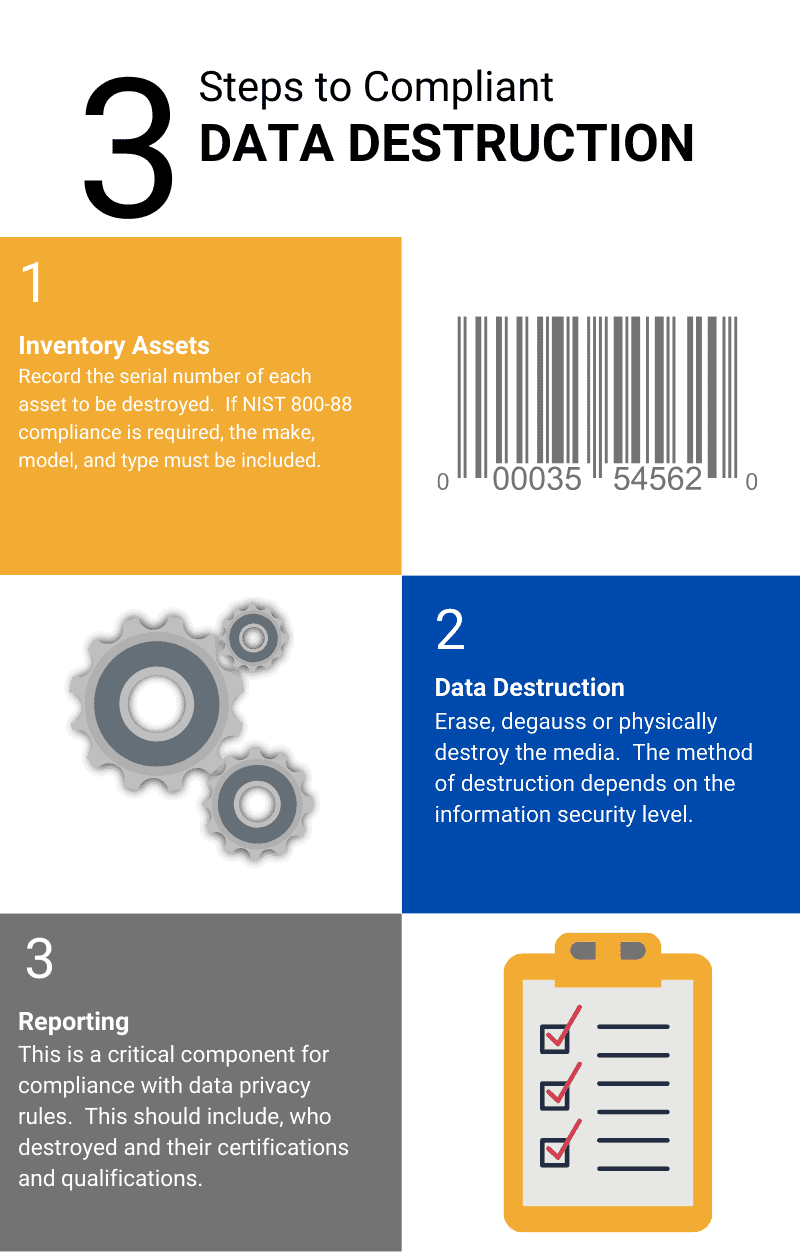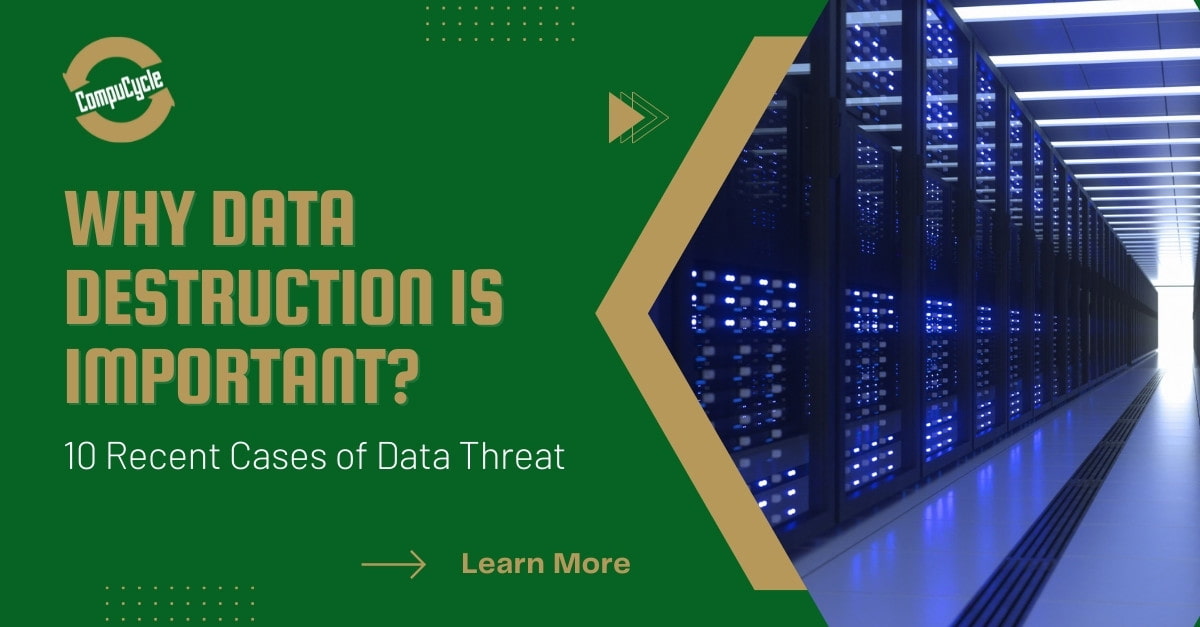The Crucial Nature of Information Devastation in Upholding Computer Safety Services and Protecting Against Unauthorized Gain Access To
In an age where data violations and identity burglary are significantly widespread, the importance of efficient data devastation can not be overemphasized. Numerous techniques, from data wiping to physical damage, offer as crucial safeguards versus unapproved access.
Value of Information Devastation
In an increasingly digital globe, the relevance of data damage can not be overemphasized. As companies collect large amounts of delicate details, the potential consequences of falling short to properly get rid of and take care of of that data come to be progressively extreme. Information breaches, identification theft, and business espionage posture substantial dangers, highlighting the necessity of reliable information destruction practices.

Furthermore, as innovation advances, so as well do the approaches by which destructive actors seek to exploit delicate info. Organizations should remain proactive and vigilant in their information devastation methods to guard against these advancing dangers. By prioritizing information destruction, firms not only protect their properties but additionally foster trust among clients and stakeholders, showing a dedication to responsible information administration and safety techniques.
Methods of Effective Information Devastation
To guarantee the irreversible and total destruction of delicate information, companies can employ a range of efficient methods customized to their specific requirements. One of one of the most typical techniques is information wiping, which includes utilizing specialized software application to overwrite existing data multiple times, making recuperation essentially difficult. This is especially beneficial for hard disk drives and solid-state drives, where standard removal methods are insufficient.
An additional efficient approach is degaussing, which makes use of strong electromagnetic fields to interfere with the magnetic domain names on storage media, rendering the information irretrievable. This technique is especially fit for magnetic storage gadgets, such as tape drives and hard disks.
Physical devastation is likewise a viable alternative, including the shredding, crushing, or incineration of storage space gadgets. This method guarantees that information can not be recuperated, making it perfect for companies managing highly delicate details.

Conformity With Information Security Regulations
Organizations should not only concentrate on efficient data damage approaches yet likewise make certain conformity with information protection policies that control exactly how sensitive info is managed and disposed of. Sticking to these policies is essential for keeping and securing personal data consumer trust fund. Laws such as the General Information Security Regulation (GDPR) in the European Union and the Health Insurance Policy Mobility and Liability Act important site (HIPAA) in the USA enforce rigorous standards on information management, which include needs for the secure disposal of delicate information.
To attain conformity, organizations should execute thorough data destruction policies that straighten with these legal structures. This includes recognizing information that calls for devastation, establishing protocols for secure methodsâEUR" such as shredding physical media or utilizing software that satisfies market criteria for data wipingâEUR" and preserving thorough records of devastation activities. Regular audits should be carried out to make sure adherence to these plans and to determine any type of possible locations for improvement.
Failure to follow information security policies can lead to substantial legal ramifications, including hefty fines and damage to a company's track record. Integrating compliance into information damage methods is not just a legal commitment however likewise a critical element of a durable details safety method.
Repercussions of Poor Data Handling
Poor information handling can cause severe effects that prolong past immediate operational obstacles. Organizations may deal with considerable economic losses because of data breaches, which frequently cause pricey removal initiatives, lawful fees, and governing penalties. These financial effects can strain resources and hinder growth, inevitably influencing a company's bottom line.
Additionally, inadequate information handling can badly damage a company's online reputation. Clients, partners, and stakeholders may lose trust fund in an entity that stops working to protect sensitive information, causing decreased customer commitment and prospective loss of company opportunities. This erosion of trust can take years to restore, if it can be brought back whatsoever.
Additionally, companies could deal with lawful ramifications arising from non-compliance with data protection regulations. Such infractions might result in investigations and fines, intensifying the economic burden and further staining the company's picture.
In the world of cybersecurity, inadequate data monitoring practices can produce susceptabilities that make systems more at risk to unauthorized access and cyberattacks. Eventually, these effects highlight the vital relevance of implementing robust data handling procedures to safeguard delicate info and maintain organizational integrity.
Ideal Practices for Secure Data Disposal


First of all, information should be identified according to its level of sensitivity. Sensitive information calls for a lot more extensive disposal approaches, such as shredding physical files Source and utilizing innovative software for electronic why not find out more information wiping. Employing qualified information destruction solutions ensures compliance with sector policies and requirements.
Second of all, organizations need to implement an information disposal policy that mandates normal audits. This policy needs to lay out the procedures for data retention and destruction, ensuring that outdated information is dealt with promptly and securely. Educating employees on these procedures is vital to fostering a society of safety understanding.
Lastly, keeping in-depth documents of disposed information boosts responsibility and supplies a clear audit path. This documents should include the kind of data ruined, the approach utilized, and the date of disposal.
Verdict
Taking on durable techniques such as data cleaning, degaussing, and physical destruction, together with conformity with regulations like GDPR and HIPAA, is crucial for protecting sensitive information. Neglecting correct data disposal methods can lead to severe repercussions, consisting of information breaches and lawful repercussions.
In a period where information violations and identification theft are significantly widespread, the significance of reliable data damage can not be overemphasized. data destruction. Information violations, identity theft, and business espionage pose substantial dangers, underscoring the requirement of effective information damage methods
Compliance with policies such as GDPR and HIPAA mandates that companies carry out rigorous data security steps, consisting of the safe damage of information at the end of its lifecycle.
By prioritizing information damage, business not just shield their properties however additionally foster trust among clients and stakeholders, demonstrating a commitment to accountable information management and protection practices.
Organizations should not only focus on efficient data devastation methods however also make certain compliance with information security policies that govern just how sensitive info is managed and disposed of.